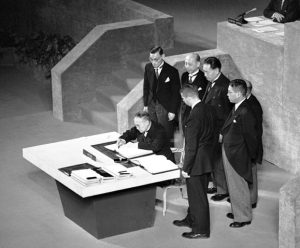China is increasingly challenging the East Asian order that was formed after World War II. In addition to the Korean Peninsula and Taiwan, China has begun to raise questions about the position of Okinawa, among other issues. The postwar international order in East Asia emerged through a series of treaties before and after the Korean War in the 1950s, with adjustments to the 1950s order being made to accommodate the treatment of Taiwan (the Republic of China, or ROC) in the 1970s, setting the stage for the current status quo. In challenging this order, China is trying to change the military security landscape, as evidenced by its military actions around the Taiwan Strait, while at the same time deploying new rhetoric at home and abroad to raise doubts about the existing order. Part of this is a denial of the “San Francisco System.”
The San Francisco Peace Treaty was a peace treaty with Japan, the defeated country, that was signed on September 8, 1951 amid the Korean War. (The treaty took effect on April 28, 1952.) Neither the People’s Republic of China (PRC) nor the ROC were invited to the conference, with Japan signing a separate peace treaty with the ROC on April 28, 1952, the Treaty of Peace between the Republic of China and Japan. Immediately after the conclusion of the San Francisco Peace Treaty, the Japan-US Security Treaty was concluded between Japan and the United States. One could argue that this peace treaty and the Japan-U.S. Security Treaty defined postwar Japan’s status. Around the time of these treaties, the United States also concluded security treaties with South Korea, ROC (Taiwan), the Philippines, Australia, and others. They became the basis of the postwar U.S. security regime in the Western Pacific.
China has long signaled that it does not attach importance to the San Francisco Treaty. In a sense, this is reasonable since China was not a signatory to the treaty. After all, China has consistently accorded significance to the Cairo Declaration and the Potsdam Declaration – and China was party to both those declarations. As early as August 15, 1951 China issued a statement about the San Francisco Peace Conference, in the name of Foreign Minister Zhou Enlai. In that statement, Zhou specified that “The PRC was excluded from its preparation, drafting and signing, and its rulings on the territory and sovereign rights of China – including the sovereignty over Taiwan – are therefore illegal and invalid.”
These reservations about the San Francisco Peace Conference and the Peace Treaty were raised in the context of the Korean War. However, now that the Taiwan issue has become a major point of contention between the United States and China, especially in this decade, China has begun to reemphasize its 1951 statement. This is especially evident in a document titled “The Taiwan Question and China’s Reunification in the New Era” that was issued in August 2022. It makes for a lengthy quote, but it is worth citing Note 2 in this document:
Between September 4 and 8, 1951, the United States gathered a number of countries in San Francisco for what they described as the San Francisco Peace Conference. Neither the PRC nor the Soviet Union received an invitation. The treaty signed at this meeting, commonly known as the Treaty of San Francisco, included an article under which Japan renounced all rights, title and claim to Taiwan and the Penghu Islands. This treaty contravened the provisions of the Declaration by United Nations signed by 26 countries – including the United States, the United Kingdom, the Soviet Union and China – in 1942, the fundamental principles of the UN Charter, and the basic norms of international law. The PRC was excluded from its preparation, drafting and signing, and its rulings on the territory and sovereign rights of China – including the sovereignty over Taiwan – are therefore illegal and invalid. The Chinese government has always refused to recognize the Treaty of San Francisco, and has never from the outset deviated from this stance. Other countries, including the Soviet Union, Poland, Czechoslovakia, the Democratic People’s Republic of Korea, Mongolia, and Vietnam, have also refused to recognize the document’s authority.
These reservations are being expressed not only in these government documents but also by researchers at the Chinese Academy of Social Sciences (CASS) and elsewhere. Reservations about the San Francisco Peace Treaty are not only concerned with the issue of Taiwan’s status. They also have much to do with issues pertaining to the Spratly Islands in the South China Sea and Okinawa. China may be trying to turn back the clock to the Cairo Declaration and the Potsdam Declaration, raising questions about the San Francisco Peace Treaty, which played a major role in reinstating defeated Japan’s position in the international community. That makes it important to continue to pay attention to pronouncements emanating from China on this discourse and history.

































